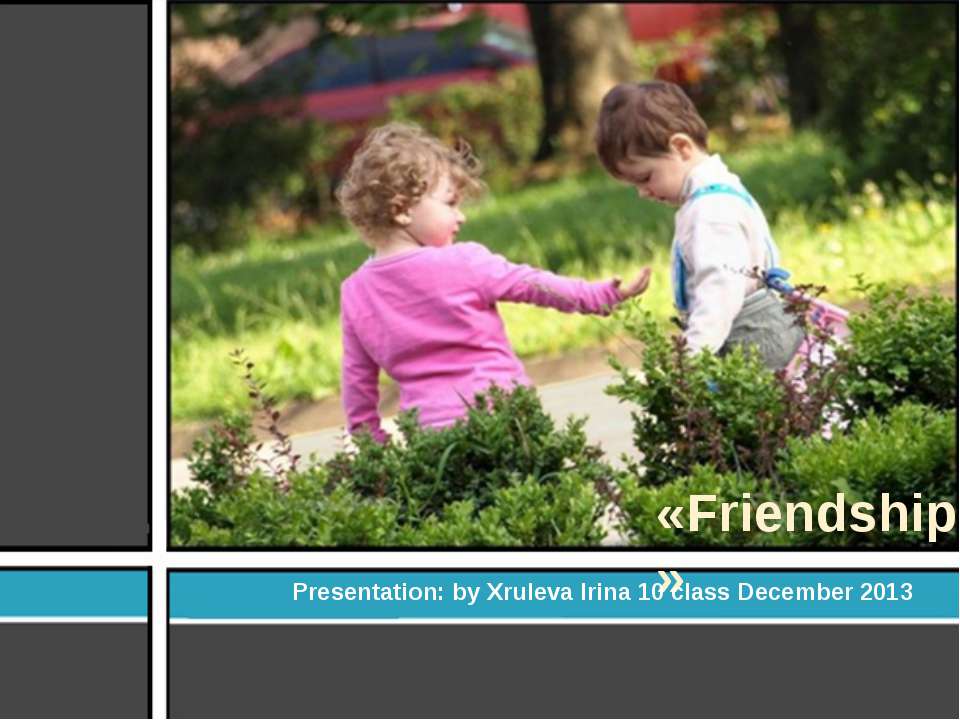Hippie

- Рубрика: Презентации / Презентации по английскому языку
- Просмотров: 143
Презентация для классов "Hippie" онлайн бесплатно на сайте электронных школьных презентаций uchebniki.org.ua
Hippie The hippie subculture was originally a youth movement that arose in the United States during the mid-1960s, swiftly spreading to other countries around the world. The etymology of the term 'hippie' is from hipster, and was initially used to describe beatniks.
The early "hippies" ideologies included the countercultural values of the Beat Generation. The Beat Generation is a term used to describe a group of American writers who came to prominence in the 1950s, and the cultural phenomena that they wrote about. There had been two world wars and a depression in just thirty years. An anti-establishment movement began. People wanted to break away from societies values placed on them. The poet Allen Ginsberg could possibly be considered the father of this movement. The poetry was not always just read but often performed to music. This is probably the source of the name given them, "The Beats".
By the fifties the movement had spread and grown. Coffee houses began to open. Places where they could meet and share thoughts. From these places emerged the "Beatniks“, typically dressed in shabby clothes, sporting a beard and wearing sunglasses at all hours. The beatniks refused to conform. The phrase "I'm Hip" was used quite often by beatniks. Their talk was said to be hip. Some even called them "Hipsters". Thus the beginning of the Hippies.
rejected established institutions criticized middle class values opposed nuclear weapons opposed the Vietnam War embraced aspects of Eastern philosophy fought for sexual liberation were often vegetarian and eco-friendly promoted the use of psychedelic drugs (which they felt expanded one's consciousness) created intentional communities or communes HIPPIES:
Hippies used alternative arts, street theatre, folk music, and psychedelic rock as a part of their lifestyle and as a way of expressing their feelings, their protests and their vision of the world and life. They perceived the dominant culture as a corrupt, monolithic entity that exercised undue power over their lives.
Hippies opposed political and social orthodoxy, choosing a gentle ideology that favored peace, love and personal freedom, perhaps best epitomized by The Beatles' song "All You Need is Love".
Imagine no possessions, I wonder if you can, no need for greed or hunger, a brotherhood of man. Imagine all the people Sharing all the world! - John Lennon Goals: Peace Love Freedom Hippies seek to change the world through reason and by living what they believe. The way to peace is through love and tolerance They believe in peace as the way to resolve differences among people, ideas, and religions.
The Hippies organized their first really big protest in Washington DC 250,000 protestors gathered for one common goal: they wanted their troops to come home from the war and for US involvement in the war to be ended. Not only Hippies were at this protest. There were also students, intellectuals, radicals, and citizens of all classes. Through the years of the Vietnam War, hundreds of anti-war rallies were held. Hippies also took part in the Civil Rights Movement.
Travel, domestic and international, was a prominent feature of hippie culture, becoming (in this communal process) an extension of friendship. School buses or the iconic VW bus, were popular because groups of friends could travel on the cheap. The VW Bus became known as a counterculture and hippie symbol, and many buses were repainted with graphics and/or custom paint jobs — these were predecessors to the modern-day art car. A peace symbol often replaced the Volkswagen logo. Many hippies favored hitchhiking as a primary mode of transport because it was economical, environmentally friendly, and a way to meet new people.
The hippie legacy in literature includes the lasting popularity of books reflecting the hippie experience; In music, the folk rock and psychedelic rock popular among hippies evolved into genres such as acid rock, world beat and heavy metal music; The tradition of hippie music festivals began in the United States in 1965. Hundreds of music festivals took place since then.
Legacy of the hippie movement: The legacy of the hippie movement continues to permeate Western society. In general: unmarried couples of all ages feel free to travel and live together without societal disapproval; frankness regarding sexual matters has become more common, and the rights of homosexual, bisexual and transsexual people have expanded; religious and cultural diversity has gained greater acceptance; greater interest in natural foods, herbal remedies, vitamins and other nutritional supplements appeared; distinct appearance and clothing became more commonplace and widely acceptable;
While many hippies made a long-term commitment to the lifestyle, some people argue that hippies "sold out" during the 1980s and became part of the materialist, consumer culture. Although not as visible as it once was, hippie culture has never died out completely: hippies and neo-hippies can still be found on college campuses, on communes, and at gatherings and festivals. Many embrace the hippie values of peace, love, and community, and hippies may still be found in bohemian enclaves around the world.
















